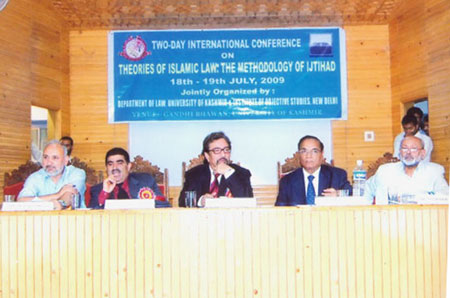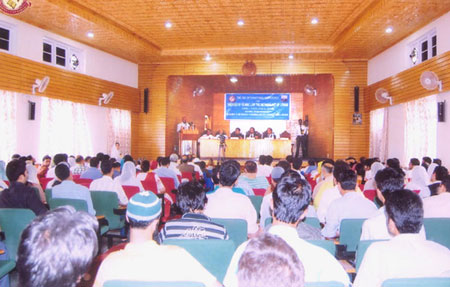TWO-DAY INTERNATIONAL CONFERENCE
(July 18-19, 2009)
Jointly Organised by
Institute of Objective Studies and Department of Law University of Kashmir
|

L-R: Prof. Mehraj Uddin Mir, Faculty of Law, University of Kashmir, Justice B.A. Kirmani (Rtd.), Prof. Riyaz Punjabi, Vice-Chancellor, University of Kashmir, Prof. Khalid Rashid, International Islamic University Malaysia,
Dr. M. Manzoor Alam, Chairman of Institute of Objective Studies
Srinagar, July 22: “The door of ijtehad (logical reasoning in approaching issues of Islamic jurisprudence) has been opened wide, not shut, as erroneously believed by many Muslims”, chairman of Institute of Objective Studies (IOS) Dr Mohammad Manzoor Alam said here on Saturday.
He was speaking at a two-day seminar on the “Theory of Islamic Law: The Methodology of Ijtehad” at Kashmir University, organised in collaboration with the IOS. He said that the door of ijtehad was never shut in the first place, after the days of the Prophet (PBUH) through the times of the four rightly-guided caliphs. In today’s complex and fast-changing world the need and justification for ijtehad has only increased.
|
|
He cited examples of ijtehad in Hazrat Umar’s caliphate. One was regarding the amputation of a thief’s hand. The law was amended in the case of theft of food items during famine. This amended law is applicable even today in food-scarce areas.
Another case of ijtehad he cited from the same period was that of horse being declared as property. During the Prophet’s time only other animals like goats and camels were “property” on which zakat was due. During Hazrat Umar’s time horse, too, became property and was brought within the ambit of zakat.
He said the Prophet (PBUH) had the advantage of divine guidance in the form of revelation (wahi), but people who came after him had the Qur’an and Hadith as guidance. According to the Prophet’s (PBUH) advice to his companion Ma’az bin Jabal in cases where these two sources did not relate to the issue at hand ijtehad would be one of the important approaches to resolving it. Today, more than at any time in the past, ijtehad, is relevant.

A view of audiance
The following set of resolutions was adopted at the end:
The Department of Law of the University of Kashmir and the Institute of Objective Studies (IOS) New Delhi express satisfaction on successful conclusion of the two-day International Conference on “Theories of Islamic Law: The Methodology of Ijtehad” held on 18-19 July, 2009 at Srinagar. After having exhaustive deliberations on relevant aspects of the theme, the conference adopts following resolutions:
- This experience confirms that the IOS would follow collaborative efforts to organise more conferences and seminars with the Department of Law and other faculties and departments of the University of Kashmir.
- All efforts should be made to bring intellectuals and ulema closer for exchange of ideas, particularly on Islamic themes and areas of national development.
- Areas of inter-community and inter-faith linkages and relations are to be worked out for joint efforts in fields of research, conducting surveys, publication and holding conferences and seminars.
- The University of Kashmir should also be meaningfully associated with the IOS in areas of youth and women’s education and welfare. Projects and schemes may be worked out based on mutual consultations.
- The IOS has a long association with the University in the field of its schemes of award of scholarships. The IOS is working hard to launch many fresh schemes of award and scholarships. All efforts should be made for creating viable mechanisms for scholars and students of the University to be associated with the Institute in these areas.
- The conference calls upon the Islamic Ummah to adopt a more meaningful and constructive approach towards Ijtehad that can prove to be a useful in solving the problems facing the ummah in line with the spirit of the Holy Qur’an and Sunnah. The collaborative efforts of Universities, research institutes and civil society need to be worked out.
|
Go Back